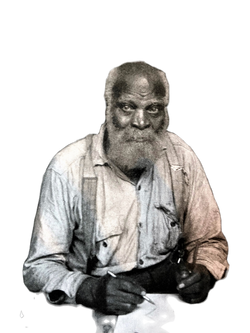
 |  |  |  |
|---|---|---|---|
 |  |
William "Bill" Traylor: A brief history
The artist known as William "Bill" Traylor (1853–1949) was born into slavery on the plantation of George Traylor in Dallas County, Alabama. After Emancipation, he didn't leave his home. He continued to work there as a sharecropper until after the death of his master, until Traylor's sons evicted him. It was then that Traylor began drawing. He was 85. He had relocated himself to Montgomery, Alabama and set up a studio on a sidewalk. His works were created in pencil, crayon, ink, and paint on pieces of salvaged cardboard. From 1939 to 1949, Traylor created works from his "studio," situated before a storefront. His exhibition space was a nearby fence. He is known to have produced at least 1500 pieces of art until his death in 1949.
The first public exhibition of Traylors' works took place in 1940, but it wasn’t until the late 1970's that he received attention, and it was the white art world that 'discovered' him. Traylor is now recognized as an important African American artist, American folk artist, American Modern artist, and Self-taught artist. His celebrity separated him from the many other self-taught artists and artisans in the South who had been born into slavery, who survived the atrocities of that system, and who went on to display their gifts and talents and skills while treading the dangerous waters of the Jim Crow era.
These artisans included visual artists, sculptors, blacksmiths, carpenters, pottery makers, jewelers, writers, and orators who created beautiful works, but had learned and honed those skills during one of the most horrific eras in American history. Each was blessed with the ability to share their lives and experiences through their art and many were exploited by folk who were used to paying little or nothing for the creativity and talent of Negroes. Traylors' works sold for between 15 cents and $2, highlighting the fact that "collectors" who voraciously bought his works were not interested in enhancing his declining quality of life. One of his better known quotes is, "Sometime dey buy 'em when dey don't even need 'em..." Traylor died destitute and alone.

